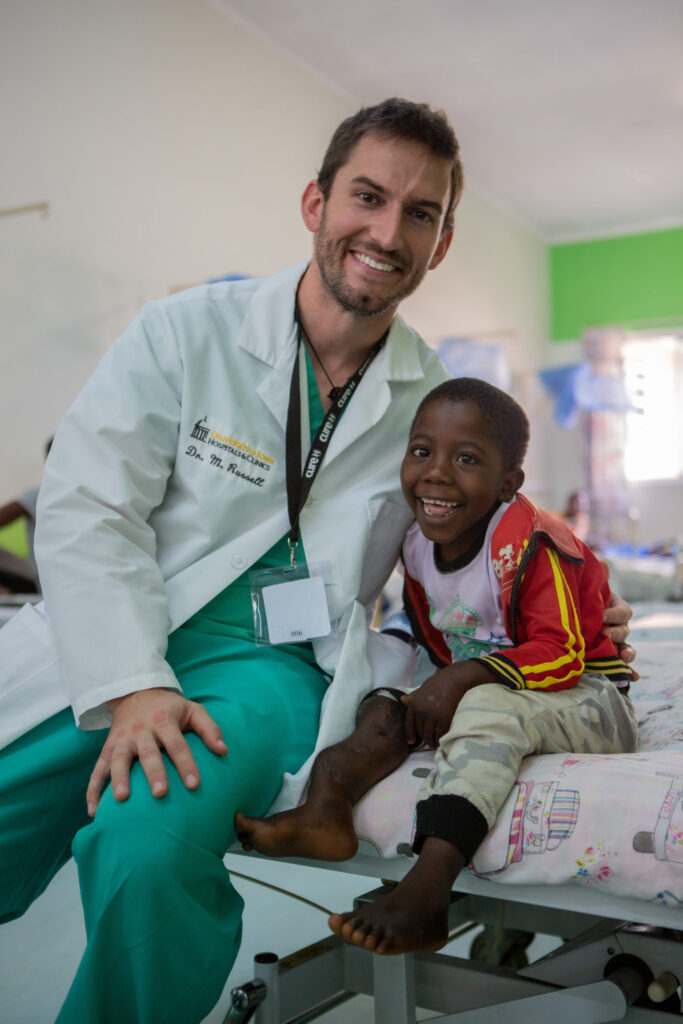From Chemical Engineer to Orthopaedic Surgeon – The Compelling Story of Dr. Michael Russell

“To give anything less than your best is to sacrifice the gift.”
This quote from long-distance runner Steve Prefontaine has left an indelible mark on the heart of Dr. Michael Russell. The future orthopedic oncologist grew up with parents who are both family medicine doctors and actively involved in medical missions. He has fond memories of their entire family taking a month off each year to serve internationally, usually in Honduras or Kenya.
“My gift is having two extraordinary parents passionate about health care, equality, spiritual evangelism, and discipleship,” shares Dr. Michael. “And so for me, it was like, ‘Okay, this is the soul awakening that I need to have, and this is what I need to pursue.’”
In June 2010, five months after a 7.0-magnitude earthquake struck Haiti, killing 220,000 people, Dr. Michael visited the country’s capital, Port-au-Prince, with his dad. Together, they saw the trauma, suffering, and what it looked like when people had no access to healthcare.
“People were living in tarpaulin structures, and many of them still had external fixators on their legs. Even here in the Western Hemisphere, only two hours from the US, there was nobody there to help them,” says Dr. Michael. “That was pretty eye-opening for me.”
Heart for global health
It was a point of no return for Dr. Michael, who was taking up chemical engineering and working for General Motors at the time. “I loved what I did, but seeing true suffering impacted my soul and really spoke to me,” he explains.
So as an engineering major in his junior year of college, Dr. Michael added pre-med coursework — and still managed to graduate in four years! Following this, he was elated to be granted admission to Texas Tech University Health Sciences Center.
To ensure that his passion for international health wasn’t just a short-term fascination, Dr. Michael requested a one-year deferral from Texas Tech. “Sometimes you can romanticize being in a place for one or two weeks, and you experience the joy that comes with short-term medical missions, but you don’t really experience the hardships of being in a resource-poor setting for a prolonged time,” he explains.
Dr. Michael spent his deferral year in the Middle East teaching English to Palestinian fourth- and sixth-grade students. After that, he went back to Texas Tech, and then, in between his second and third years of medical school, he took another deferral year to complete both an MBA and an MPH.
“I felt called towards surgery at that point, but I wanted to see what particular aspect of surgery, so I spent three months of that deferral year working internationally with several NGOs including CURE on the clubfoot side of things,” says Dr. Michael.
Focus on pediatric orthopedics
During this time, Dr. Michael fell in love with pediatric orthopedics and its application from a global health perspective.
“What really attracted me to CURE was the opportunity to help prevent long-term disability through low-cost, mostly public health-based interventions,” says Dr. Michael. “That year was what pushed me towards orthopedics in general.”
As of this writing, Dr. Michael is in his last year as an orthopedic surgery resident at the University of Iowa. In 2023, he will train as an orthopedic oncology fellow at UCLA, focusing on pediatric bone tumors. Upon completion, Dr. Michael says he wants to “jump in full-time internationally, likely in East Africa.”
CURE has a special place in Dr. Michael’s heart because his dad introduced him to the organization. He has since done some work at several CURE hospitals, including Ethiopia, Kenya, and Malawi.
Dr. Michael has also attended the Global Missions Health Conference a couple of times — once while in medical school and also during his residency — where he made connections with people from CURE and other organizations that are actively involved in the countries where he feels called to serve.
“As you come back to these meetings, you see the same people again and again, and it’s really a neat time to compare stories and see what’s working for them and what’s not working, especially as we get ready to embark on a long-term career dedicated towards medical missions,” Dr. Michael shares.”
Caring for vulnerable children
What impresses Dr. Michael the most about CURE is its intentional focus on children with treatable disabilities. “It’s something a lot of people get really impassioned about, both from a surgical practitioner’s perspective and also from a donor base,” he says. “I think the part that really impresses me is kids being impacted in such a positive fashion through CURE, which for me is really empowering.”
Dr. Michael also appreciates the collaborative nature of CURE’s work, such as with the Pan-African Academy of Christian Surgeons. He says having seen them work together on the ground in Ethiopia is “really affirmational.”
In the end, what Dr. Michael finds compelling is the opportunity to use his education, training, and skills — his best gift — to bring hope and healing to the world’s most vulnerable children, potentially through the ministry of CURE.
“If it weren’t for CURE, many children with disabilities wouldn’t have a chance to live a normal life,” Dr. Michael explains. “What really impassions me about pediatric orthopedics is that many of these conditions are very treatable, which can allow kids to grow up strong, confident, and able to fully participate in the life of their community.”
